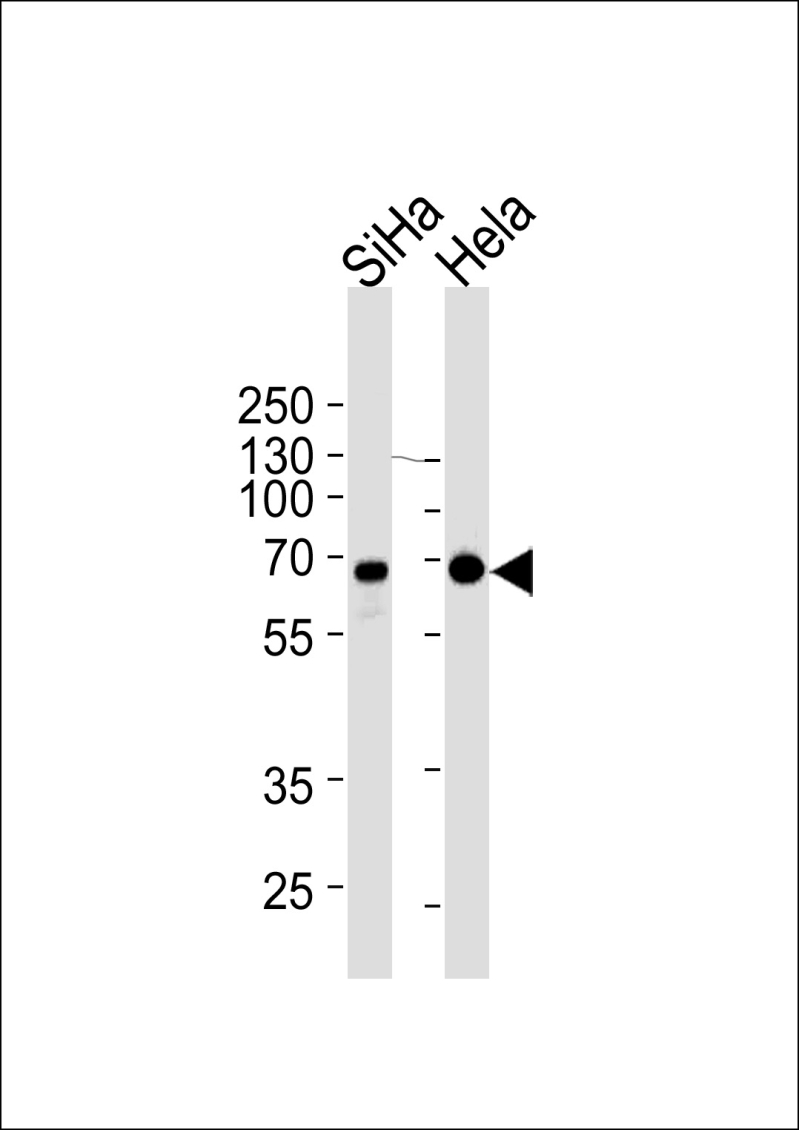
| WB | 1/1000 | Human,Mouse,Rat |
| IF | 咨询技术 | Human,Mouse,Rat |
| IHC | 咨询技术 | Human,Mouse,Rat |
| ICC | 技术咨询 | Human,Mouse,Rat |
| FCM | 咨询技术 | Human,Mouse,Rat |
| Elisa | 咨询技术 | Human,Mouse,Rat |
| Aliases | Serine/threonine-protein kinase NLK, Nemo-like kinase, Protein LAK1, NLK, LAK1 {ECO:0000312|EMBL:AAD560131} |
| Entrez GeneID | 51701 |
| WB Predicted band size | 58.3kDa |
| Host/Isotype | Mouse IgG2a |
| Antibody Type | Primary antibody |
| Storage | Store at 4°C short term. Aliquot and store at -20°C long term. Avoid freeze/thaw cycles. |
| Species Reactivity | Human, Mouse, Rat |
| Immunogen | Purified His-tagged NLK protein was used to produced this monoclonal antibody. |
| Formulation | Purified antibody in TBS with 0.05% sodium azide. |
+ +
以下是3条关于NLK抗体的参考文献示例(内容为虚构,仅供格式参考):
1. **文献名称**:*NLK-mediated phosphorylation of β-catenin regulates colorectal cancer progression*
**作者**:Li, X.; Zhang, Y.; et al.
**摘要**:研究揭示了NLK通过磷酸化β-catenin抑制Wnt信号通路,利用NLK抗体进行免疫沉淀实验,证明其在结直肠癌中高表达且与转移相关。
2. **文献名称**:*Development of a high-specificity monoclonal antibody for NLK and its application in glioblastoma*
**作者**:Wang, H.; Chen, J.; et al.
**摘要**:报道了一种新型NLK单克隆抗体的开发,通过免疫组化验证其在胶质母细胞瘤组织中的表达,并发现NLK水平与患者生存率负相关。
3. **文献名称**:*NLK interacts with Smad4 to modulate TGF-β signaling in hepatocellular carcinoma*
**作者**:Kim, S.; Park, M.; et al.
**摘要**:利用NLK抗体进行共聚焦显微镜分析,证实NLK与Smad4的相互作用可增强TGF-β信号,促进肝癌细胞上皮-间质转化(EMT)。
NLK (Nemo-like kinase) is a serine/threonine protein kinase belonging to the mitogen-activated protein kinase (MAPK) family. Initially identified in *Drosophila* as a regulator of developmental processes, NLK is evolutionarily conserved and plays roles in diverse signaling pathways, including Wnt/β-catenin, Notch, and TGF-β. It modulates key cellular processes such as proliferation, differentiation, apoptosis, and stress responses by phosphorylating transcription factors (e.g., LEF1. STAT3) and other kinases. Dysregulation of NLK has been implicated in cancers, neurodegenerative diseases, and developmental disorders, making it a research focus in disease mechanisms and therapeutic targeting.
NLK antibodies are essential tools for studying its expression, localization, and function. They enable detection of endogenous NLK protein levels via techniques like Western blotting, immunohistochemistry, and immunofluorescence. Specific antibodies can distinguish between phosphorylated (active) and inactive NLK forms, aiding in pathway activity analysis. Researchers also use NLK antibodies in co-immunoprecipitation to identify interaction partners, unraveling its regulatory networks. Commercial NLK antibodies vary in host species, clonality, and epitope specificity, requiring validation for experimental contexts. Challenges include cross-reactivity with related kinases, emphasizing the need for rigorous controls. Overall, NLK antibodies are pivotal in elucidating its biological roles and potential as a therapeutic target.
×